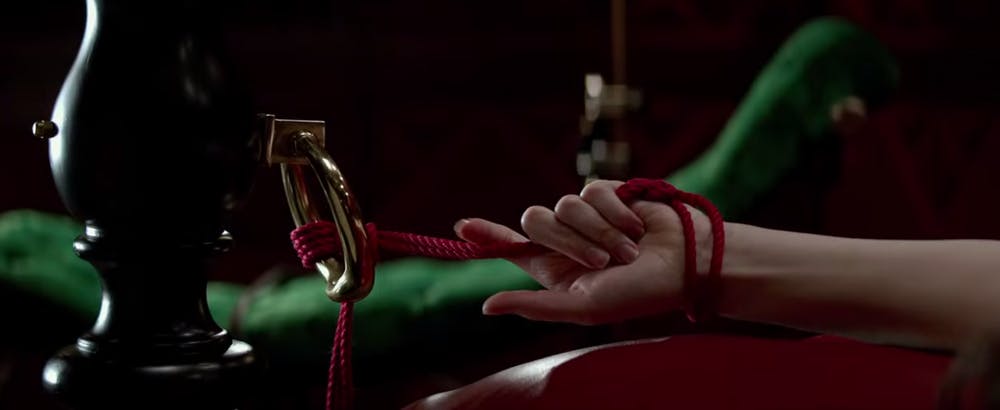In the weeks leading up to the much-hyped Fifty Shades of Grey premiere, much ink has been spilled over the film: How there aren’t enough steamy sex scenes, how the lead stars secretly hate each other, and how it’s inspired numerous PR firms to come up with witty whipping/spanking puns to help pimp out their products. (“Fifty Shades of Wine,” anyone?).
But what of the feminists and far-right Christian activists who have been criticized the book for years, arguing that it romanticizes coercive sex and domestic violence against women? These protesters have been staying silent—until now.
“Fifty Shades of Grey is violent against women,” a woman in a knit cap bellows in front of the Regal Union Square Theater in New York City. She’s holding a sign protesting with a small group in front of the theater. “Don’t support rape and violence against women.”
The woman is part of a group called Stop Patriarchy, which describes itself as a “call to action” to “end pornography and patriarchy” on its website. The Union Square protest is just one of many that will be held at theaters across the country, from New York to Los Angeles to the Bay Area, which Stop Patriarchy is promoting with the hashtag #fuck50shades.
“We’re out here at the premiere of Fifty Shades of Grey because the movie celebrates violence against women, and this movement fights against all forms of the enslavement and degradation of women that seeps into all parts of our culture,” Riley, a pixie-like woman with an asymmetrical haircut and nose ring, tells me. “So we’re here to stand up against that.”
Women have been held down by the chains of patriarchy for centuries.Now it's sexy? Fuck that shit! Fight 4 women's liberation! #Fuck50Shades
— RevCom Corps NYC🌏 (@RevComCorpsNYC) February 13, 2015
https://twitter.com/LilyBluestockin/status/565831511392272384
https://twitter.com/mmontour/status/565733853017669633
Since its publication in 2012, Fifty Shades has been maligned by radical feminist and far-right Christian groups, who have found surprising common ground over the film’s depiction of a relationship between Christian Grey, a wealthy, possessive sadist, and Anastasia Steele, the naive, sexually inexperienced woman who finds herself becoming his submissive.
Many critics within the BDSM community have argued that the film blurs the line of consent (one of the guiding principles of dominant/submissive play), and propagates negative stereotypes about BDSM, such as the notion that kinky people are cold, manipulative, and emotionally damaged. Throughout the book and film, Christian also exhibits alarmingly controlling behavior for a dom, such as tracking Anastasia’s location without her knowledge, asking her to sign a contract where he dictates what she eats and drinks, and, in one climactic scene, beating her with a belt to the point where she weeps with pain.
“I think Fifty Shades of Grey is the story of an abusive man who likes kinky sex,” Feminista Jones, a noted feminist writer who is a member of the kink community, told me last month. “He was a lot more manipulative than a dom should be. You should never feel [the way Anastasia does] in a BDSM relationship. You can commit to someone and pledge to someone, but you should always feel with a snap of a finger that you can walk away. There’s a lot more agency in this lifestyle than Fifty Shades [would indicate].”
Those protesting Fifty Shades with Stop Patriarchy, however, take a slightly different tack. They’re not opposed to what they perceive as an unfair depiction of the kink community. They’re opposed to the glamorization of BDSM in general, on the grounds that it’s inherently oppressive to women.
“We are about standing up against a whole culture and what people are trained to think is sexy, including things like BDSM,” Riley told me. “It’s not about being bedroom police or shaming them. It’s about challenging people to think about why being violent and degrading to a person is sexy.”
When asked why it’s important for people to challenge and question the nuances of their sexual fantasies and desires, especially when women in particular are already discouraged from having such desires to begin with, Riley is slightly more circumspect. “We find [the popularity of Fifty Shades of Grey and BDSM] as not just human nature, but the result of a whole system that trains people to think and relate to each other under a patriarchal system,” she says.
Of course, regardless of whether Riley and other Stop Patriarchy members believe that women should think Fifty Shades and BDSM are sexy, the truth is that millions of women already do. The book has sold 100 million copies since its release; and according to Fandango, the Fifty Shades movie is one of the top five advance ticket sellers in the website’s history, selling out hundreds of screenings across the country.
Still, Stop Patriarchy hopes that those who come to see their favorite “mommy porn” on the big screen will join them in “boldly and unapologetically standing up against the oppression of women,” as Riley explained.
“There’s a lot of people who feel the way we do about this culture or this film in particular, but they’re afraid to voice their opinion,” she said. “We want to mobilize and bring more people into this movement.”
Screengrab via Universal Pictures UK/YouTube



